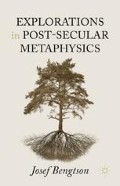Abstract
In the paradigmatical accounts of religion from the late eighteenth century, such as Kant’s Religion Within the Boundaries or Mere Reason (1793), and Schleiermacher’s On Religion: Speeches to Its Cultured Despisers (1799), religion is approached in terms of disembodied thought and feeling. Furthermore, religion was believed to have an essence, and was thus approached as a generic category, as something of its own kind. According to Kant, the essence of religion lies in its moral functions; in “the recognition of our duties as divine commands,”1 while for Schleiermacher, the essence of religion is defined as “neither thinking nor acting, but intuition and feeling.”2 Kant’s disembodied notion of “pure reason,” understood as a non-religiously informed reason that is supposed to resolve moral and political matters in a way that is able to convince every rational human being, can in this sense be seen as paradigmatic for the modern notion of the secular as neutral or unbiased. This approach privileges secular reason, understood as a mode of universal discourse able to transcend particular traditions and religious forms of reasoning. According to the American scholar of religion Wayne Proudfoot “[t]he turn to religious experience was motivated in large part by an interest in freeing religious doctrine and practice from dependence on metaphysical beliefs and ecclesiastical institutions and grounding it in human experience.”3
Access this chapter
Tax calculation will be finalised at checkout
Purchases are for personal use only
Preview
Unable to display preview. Download preview PDF.
Notes
Immanuel Kant, Critique of the Power of Judgment (Cambridge University Press, 2000), 343.
Friedrich Schleiermacher, Schleiermacher: On Religion: Speeches to Its Cultured Despisers (Cambridge University Press, 1996), 22.
Wayne Proudfoot, Religious Experience (University of California Press, 1987), xii.
For contemporary developments of this approach, see: Jürgen Habermas et al., The Power of Religion in the Public Sphere (Columbia University Press, 2011), 65–68
John Rawls “Justice as Fairness: Political Not Metaphysical,” Philosophy & Public Affairs 14, no. 3 (n.d.): 223–251, accessed May 17, 2012.
José Casanova “The Secular, Secularizations, and Secularism” in Craig Calhoun, Mark Juergensmeyer, and Jonathan VanAntwerpen, Rethinking Secularism (New York: Oxford University Press, 2011), 56.
Jim Stone “A Theory of Religion Revised,” Religious Studies 37, no. 2 (2001): 181.
Caroline Schaffalitzky de Muckadell “On Essentialism and Real Definitions of Religion,” Journal of the American Academy of Religion 82, no. 2 (2014): 508.
Timothy Fitzgerald, The Ideology of Religious Studies (Oxford University Press, 2003), 16.
See, Talal Asad, Genealogies of Religion. Discipline and Reasons of Power in Christianity and Islam (Baltimore: The John Hopkins University Press, 1993)
Timothy Fitzgerald, Discourse on Civility and Barbarity (Oxford University Press, 2007)
Russell McCutcheon, Manufacturing Religion (New York: Oxford University Press, 1997)
Daniel Dubuisson, The Western Construction of Religion. Myths, Knowledge, and Ideology (Baltimore: The John Hopkins University Press, 2007)
Russell T. McCutcheon, Manufacturing Religion: The Discourse on Sui Generis Religion and the Politics of Nostalgia (Oxford University Press, 2003), 3.
Clayton Crockett, Radical Political Theology: Religion and Politics After Liberalism (Columbia University Press, 2011), 2.
Plato, Timaeus and Critias (Oxford University Press, 2008), 16
For an interesting account of this distinction see, Robert Bolton “Plato’s Distinction between Being and Becoming,” The Review of Metaphysics 29, no. 1 (September 1, 1975): 66–95.
Michael Loux, Metaphysics: A Contemporary Introduction (Routledge, 2013), 4–5.
Adrian Pabst, Metaphysics: The Creation of Hierarchy (Wm. B. Eerdmans Publishing Company, 2012), xxix.
Philip Tonner, Heidegger, Metaphysics and the Univocity of Being (Continuum International Publishing Group, 2010), 18.
Richard Cross, Duns Scotus (Oxford University Press, USA, 1999), 33.
Brad S. Gregory, The Unintended Reformation: How a Religious Revolution Secularized Society (Harvard University Press, 2012), 36–38.
Johann Georg Hamann, Hamann: Writings on Philosophy and Language (Cambridge University Press, 2007), xvii.
Stephen K. White, Sustaining Affirmation: The Strengths of Weak Ontology in Political Theory (Princeton University Press, 2000), 4.
Kristen Deede Johnson, Theology, Political Theory, and Pluralism: Beyond Tolerance and Difference (Cambridge University Press, 2007), 20–21.
E.J. Lowe, An Introduction to the Philosophy of Mind (Cambridge University Press, 2000), 4.
Sandra Harding and Merrill B. Hintikka, Discovering Reality: Feminist Perspectives on Epistemology, Metaphysics, Methodology, and Philosophy of Science (Springer, 2003), xv.
Paul W. Franks, All Or Nothing: Systematicity, Transcendental Arguments, and Skepticism in German Idealism (Harvard University Press, 2005), 20.
Christopher Ben Simpson, Religion, Metaphysics, and the Postmodern: William Desmond and John D. Caputo (Indiana University Press, 2009), 1.
See, for example: Anthony Paul Smith, Pamela Sue Anderson, and Daniel Whistler, eds, After the Postsecular and the Postmodern: New Essays in Continental Philosophy of Religion (Cambridge Scholars Publisher, 2011)
Clayton Crockett, B. Keith Putt, and Jeffrey W. Robbins, eds, The Future of Continental Philosophy of Religion (Bloomington: Indiana University Press, 2014).
For an introduction to this stream of thought, see: Levi Bryant, Nick Srnicek, and Graham Harman, The Speculative Turn: Continental Materialism and Realism (re.press, 2011).
Quentin Meillassoux and Ray Brassier, After Finitude: An Essay on the Necessity of Contingency (Continuum International Publishing Group, 2010), 46.
Quentin Meillassoux “The Immanence of the World Beyond” in Peter M. Candler, Jr. and Conor Cunningham, The Grandeur of Reason: Religion, Tradition and Universalism (SCM Press, 2010), 445.
Bruno Latour, On the Modern Cult of the Factish Gods (Duke University Press, 2010), 46–47.
Iris Marion Young, Justice and the Politics of Difference (Princeton University Press, 2011), 156–191.
John Gray, Two Faces of Liberalism (Polity Press, 2000), 1.
John Gray, Enlightenment’s Wake: Politics and Culture at the Close of the Modern Age (Routledge, 2007), 102–106.
Bruce Lincoln, Religion, Empire, and Torture: The Case of Achaemenian Persia, with a Postscript on Abu Ghraib (University of Chicago Press, 2010), 97.
Charles T. Mathewes, A Theology of Public Life (Cambridge University Press, 2007), 112.
Author information
Authors and Affiliations
Copyright information
© 2015 Josef Bengtson
About this chapter
Cite this chapter
Bengtson, J. (2015). Whose Religion, Which Secular?. In: Explorations in Post-Secular Metaphysics. Palgrave Macmillan, London. https://doi.org/10.1057/9781137553362_2
Download citation
DOI: https://doi.org/10.1057/9781137553362_2
Published:
Publisher Name: Palgrave Macmillan, London
Print ISBN: 978-1-349-56049-3
Online ISBN: 978-1-137-55336-2
eBook Packages: Palgrave Religion & Philosophy CollectionPhilosophy and Religion (R0)

